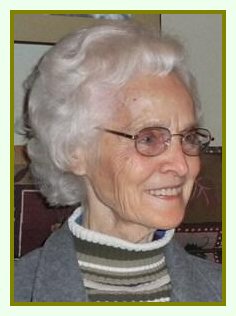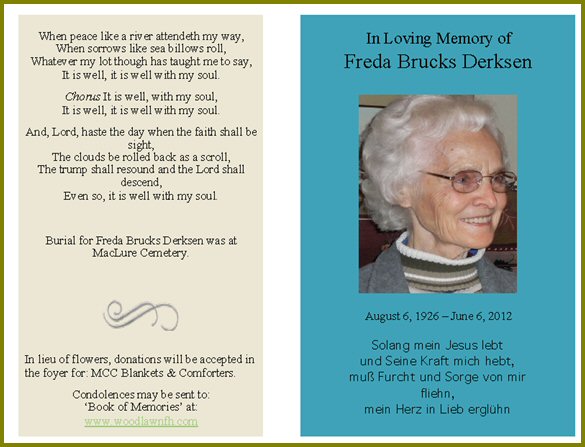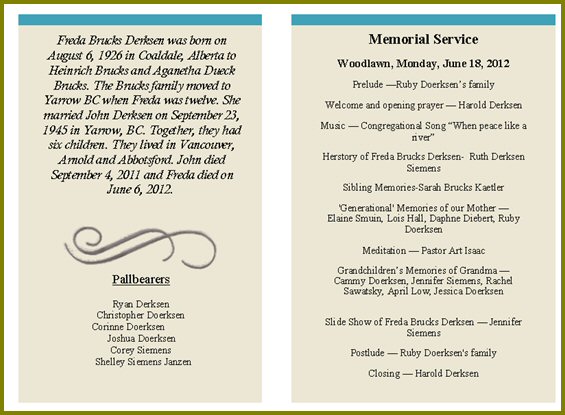|
 The Her-story of Freda Brucks Derksen
The Her-story of Freda Brucks Derksen
Freda Brucks Derksen died on Wednesday, June 6 at 85 years of age. She was born in Coaldale, Alberta to Aganetha Dueck Brucks and Heinrich Brucks on August 6, 1926. The Brucks family moved to Yarrow BC when Freda was twelve. She married John Derksen in Yarrow on September 23, 1945. Together, they had six children. They lived in Vancouver, Arnold and Abbotsford. Predeceased by her husband John who died September 4, 2011, her parents, and eight siblings, Freda is mourned by her last remaining sister, Sarah Brucks Siebert and her children: Harold (Danie Tremblay), Elaine (Les Smuin), Ruth (Vic Derksen Siemens), Lois (Brian Hall), Daphne (Tim Diebert), Ruby (Ken Doerksen), 21 grandchildren, 19 great grandchildren and two great-great grandchildren. She is also mourned by many nieces, nephews, relatives and friends.
The burial at Maclure Cemetery will be held on Monday, June 18 at 10:30 am. The funeral service will follow at 2:00 pm at Woodlawn Funeral Home (2310 Clearbrook Road). Donations in memory of Freda can be made to "MCC Blankets and Comforters".
They say that "when someone dies a library burns." Here is a glimpse into the library of our mother's life. She was born in Coaldale, Alberta to Aganetha Dueck Brucks and Heinrich Brucks on August 6, 1926. She had been conceived in Russia, so Freda travelled in a safe place during the tumultuous voyage to Canada.
When the baby was born, the Brucks family lived in an abandoned train car in Coaldale, Alberta. They named the new baby Klar-Freda ("clear freedom") to celebrate their emancipation from the burden and sorrow of Russia. The new baby's bed was a small wooden apple box lined with straw and fabric.
Everyone worked from morning to night — hoeing, planting, harvesting for local farmers. Knitting and sewing were not luxuries — they were survival skills (socks, gloves, sweaters, complete wardrobes were needed). Some of the older sisters worked as maids in the city and countryside. The family saved enough to buy an old house on abandoned land. In summer, wind and dust moved in through the cracks and in winter, frost covered the inside walls. But it was their home and they were free. However, a severe winter resulted in frozen crops. Farmers lost all their profits. Only $5 was given to the family for all their summer work. Grandpa knew they would starve if they stayed in the country. They had to move to Lethbridge (closest city). Grandpa went to the bank, deposited the $5 and told the bank manager, "This is all we have. We will starve if I do not find work." A few days later, a truck arrived at their home in Lethbridge. Food (fresh, tinned, boxed), clothes and shoes for everyone, coal for the stove and even Christmas presents were unloaded into the room filled with awe-struck children. That year Christmas lasted a long time.
Once more, everyone who could move - worked. Food and shelter were paid for. Land was bought in Coaldale, children went to school, church and German school. Life was stable. But dreams of moving to BC began. Some other families had moved. It was a difficult decision. After leaving Russia, packing and moving again was not welcome. But it was the "land of milk and honey". The soil was rich, fields produced berries, rivers were filled with fish, dust storms were non-existent and the winters were mild. So Grandpa and Grandma went to the prayer meeting at the Coaldale Mennonite Brethren Church. Two pieces of paper were presented - one read "Move to BC" and the other "Do not move to BC". Everyone prayed and asked God to guide the leader who chose one piece of paper. It read "move to BC". This was God's will.
The Brucks family moved to Yarrow BC when Freda was twelve. School attendance was considered to be unnecessary. Freda was needed to help her aging parents. But Bible School later in her teens was approved. Valuable friendships were formed during the three years of Bible School. Knitting and sewing now became more than survival skills. They were creative expressions of an artistic young woman. Freda copied patterns from friends, magazines and the Eaton's catalogue. She also created her own intricate designs. Dresses, tablecloths, doilies, lace collars and embroidered bedding filled her room and hope chest.
Dating was not permitted, but writing letters was acceptable. A request for a visit resulted in a handsome young man (with a secure job in the Yarrow Co-op) being invited to the Brucks household for a conversation in the front room. Several more letters were exchanged, one ride home from choir practice was offered and Freda became engaged to marry John Derksen. They married four months after the end of Bible School on September 23, 1945.
The first pregnancy prompted the selling of the two-room house on Cherry Avenue. In a larger house on a 19-acre farm, the first baby was born (Harold in 1946). Another move followed to a 7-acre farm and a second baby was born (Elaine in 1948). Farming became less desirable and more challenging. Going back to school seemed logical. With our mother's support, Dad completed Grade 13 in Chilliwack. A move to Vancouver facilitated further schooling and more profitable work. A third baby, (Ruth) was born in Vancouver in 1949. Knitting baby clothes and sewing continued. From castaway clothing in the United Church basement, used men's suits became a little boy's suit and a mother's skirt. Ladies' wool coats with fox fur trim became two fur-trimmed coats with matching bonnets for little girls. The magic of our mother! She could take the unwanted, the unimportant and meaningless and transform them into something valued, useful and even beautiful — not only fabric but circumstances. An anecdote describes this best.
1951 was one of those many summers in Vancouver when Mom packed up her three oldest children (Harold, Elaine, Ruth) to pick berries at Grandpa and Grandma Derksen's farm in Yarrow. We stayed in the picker's cabin, an old renovated barn. Every day she was ready with blankets, food and drink for the day. "The berries are falling" was Grandpa's constant refrain.
But one day was like no other: the Queen and Prince Phillip were coming to Chilliwack. Yarrow was astir. Mennonites did not easily leave their falling berries, braying cows, or hungry chickens. But the Queen was coming! Every available car was going to Chilliwack. Of course Grandpa was taking his car, but he was not intending to fill it with three sniveling, potentially car-sick kids. So the car left filled with adults.
Our mother schemed. She had a plan. She and the children picked furiously until noon, motivated by the promised event. They were going to see the Queen! Food and blankets were packed and they walked almost three miles north across plowed fields, around ditches, through mud, and seeded ground. Mom knew there was only one way to travel from Vancouver to Chilliwack. The side of the highway was level enough for a blanket. Predictably, the entourage appeared: motor cycles, police escort, and an open convertible with a chauffeur, Prince Phillip, and Queen Elizabeth. We hardly breathed as we watched and waved. The parade moved closer. Then it stopped! Right in front of us! The Prince stepped out, crossed to the driver's side and closed the door. This was likely a last opportunity for him to take the wheel before the formalities of Chilliwack. But we saw them! All of them at close range, and they turned and waved to us.
We floated back across those fields. Mom whispered to us, "This is our little secret. Let's not tell anyone." But when we saw Grandpa, we were exuberant: "We saw the Queen! We saw the Queen!" The berries were still falling but it didn't matter. Mom and her children had seen the queen.
After six years of picking berries in summer, part time and full time work, Dad was finally able to go to Vancouver Normal School. Finances were tight. Mom worked many part time jobs: day work cleaning houses and evening work at Hotel Vancouver. The sewing machine worked overtime. Knitting needles made new baby clothes and signaled another pregnancy. A new baby arrived in 1955 (Lois). Dad graduated with his Teaching Certificate in 1956. Another baby (Daphne) was born that year. But stability returned with a fully employed father and partly employed mother.
In 1959 Dad accepted a job at Abbotsford Senior High School. More pay and lower house prices were a relief. The Derksen family moved to Arnold in Sumas Prairie and lived there until 1966. With a household of children and a store to run, the sewing machine and knitting needles still clacked and purred late into the night. Creatively designed outfits clothed all six of us for Christmas, Easter, Thanksgiving and every event between. Then the baby patterns came out once more; a tiny cap with matching sweater and intertwined ribbon. Ruby was born in 1963. She did not have much peace and quiet.
Another move followed to Abbotsford in 1966 with new school appointments, and new churches (Clearbrook MB and Ross Rd. MB). Graduations, engagements and weddings all needed dresses, jackets, sweaters, and hope chests. Dad retired from teaching in 1983 (at age 61). Our parents travelled more, volunteered at a home for disabled in Manitoba, and worked at Columbia Bible Camp — enjoying their freedom. But mom's fingers didn't stop stitching. Now there were new grandchildren and great grandchildren. She made baby shawls, quilts, blankets and crocheted tablecloths. MCC also benefited from many of her quilts.
Dad died nine months ago on September 4, 2011. Now the place Mom and Dad called home for many years has been sold. Possessions have been sorted and divided, but the basket of yarn, knitting needles, crochet hooks, patterns and treadle sewing machine remain in the family. And the legacy of creativity, making something useful and beautiful from discards, resourcefulness, joy of artistic expression and bringing magic into an ordinary day have been passed on.


|
